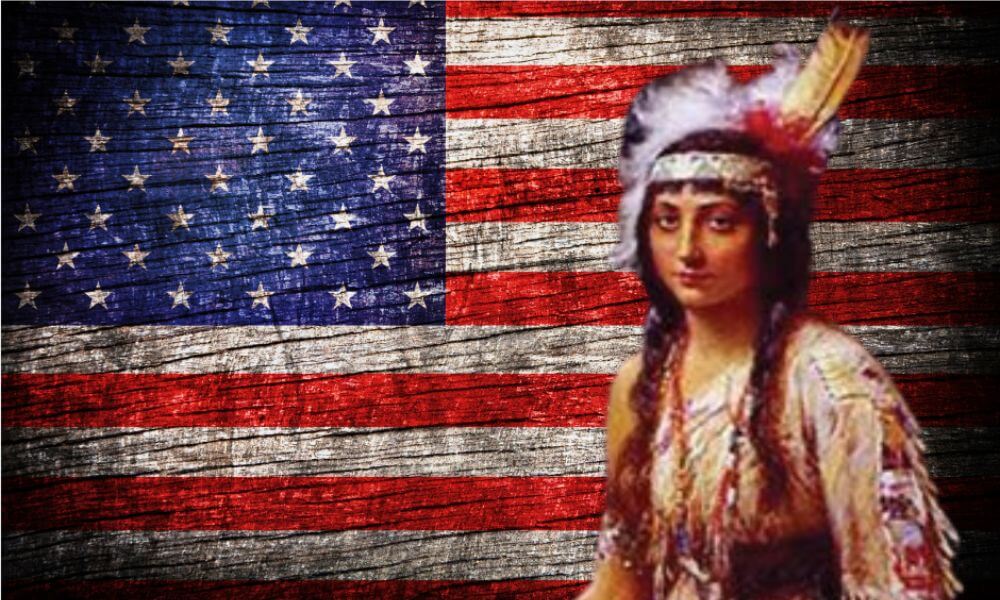Pocahontas would have spoken the Powhatan language, an Eastern Algonquian language group comprising several languages in the broader Algonquian group. Not very much is known about this language, and Pocahontas would have spoken English later in life as she travelled outside of America. We know vanishingly little about her native language, then.
So, while we know for certain the language that Pocahontas spoke, we know very little about the language itself.
Pocahontas is in many ways a real historical figure who has gained mythic significance, and so many details of her life are somewhat murky.
We know, for certain, the groups to which she belonged, however, and thus we can say for certain the language she spoke.
Let’s find out more.

What was Pocahontas’ native language?
Pocahontas’ native language was the Powhatan language.
This language was also called Virginia Algonquian, and was an Eastern Algonquian language of the Native Americans.
The broader Algonquian language group comprises a wide subgroup of Indigenous American languages, including most of the languages in the Algic language family.
There are many subdivisions to this group, of which Eastern Algonquian was just one.
Originally, prior to European contact, there were at least 17 languages in this group alone.
Pocahontas was born sometime around the end of the 16th Century, though her birthyear is unknown.
Explorer John Smith described meeting her when she was about ten years old, in 1608, though he later said she had been 12 or 13.
She was the daughter of Chief Powhatan, who was the paramount chief of a group comprising around thirty Algonquian speaking groups in present day Virginia.
The tribe to which she belonged, then, spoke Powhatan.
Powhatan itself can include multiple groups who may have spoken different languages.
The Powhatan language, though, is recognized mainly as a single linguistic division which would have been spoken by the tribe of Pocahontas.
This is what she would have been raised speaking, and indeed even some explorers lived among the Powhatan people as interpreters.
Documentary evidence for this language, though, is extremely sparse.
It consists of two short wordlists which were recorded around the time of the first European contact with the tribes; around 500 words were recorded by William Strachey and around 50 by Captain John Smith.
Linguistic research in the 1970s sought to reconstruct the language, and this was done so with assistance from other, more well documented Algonquian languages.
Unfortunately, though, much of the language that Pocahontas spoke is lost to us.
Is it, then, an extinct language?
Is the Powhatan language extinct?
The Powhatan language is, sadly, extinct today.
There are no living native speakers, and there have not been for centuries.
The last speakers are estimated to have died around 1785 or 1790, and since then the language has fallen entirely out of use.
Indeed, whereas many languages which are fully documented and available to us, like Latin or ancient Greek, are still extinct,
Powhatan is lost save for the short wordlists mentioned above.
Indeed, many Native American languages were entirely lost during the early periods of exploration for one reason or another.
Many tribes were entirely massacred by explorers, or were wiped out by diseases brought by Europeans to which they had no immunity. Even among those who survived, their native languages were often systematically stamped out by colonizers.
So, the language of Pocahontas and her family has been lost to us.
Fortunately, though, the very reason that Pocahontas is known is because of her relations with explorers and colonists, and that meant that she did not only speak her native tongue.
Did Pocahontas speak English?
Pocahontas did indeed speak English, and she traveled widely during her life.
She was captured for ransom in 1613 during hostilities between natives and colonists, and during this time she was encouraged to convert to Christianity and given a western name: Rebecca.
She married Thomas Rolfe in 1615, and was taken to London in 1616 where she was presented as the prime example of a “cilivized savage”.
She learned English during this time and became something of a celebrity in England during her time there.
For a long time, then, English would have been the only language she spoke, though of course there are no concrete accounts of how well she spoke it; plainly, though, she could do enough to become very popular in England.
What did the English call Pocahontas?
Pocahontas was known to the English as Lady Rebecca Rolfe.
As mentioned, she took on a Christian name and of course adopted both the surname of the man she married and the title, “Lady”, that went along with it.
Many of the stories we know of Pocahontas today are highly fictionalized, and her name is one area where there is a degree of mystery.
It is claimed that her original name was Matoax and that her true name was concealed from the English.
This was out of a superstitious fear that, by knowing her name, they could cause her some harm in some way.
So, even Pocahontas may not have been her true name when the English called her that.
Pocahontas, then, is a figure of both historical and legendary status.
Virtually everyone in America and even Europe has heard of her, if only due to the Disney movie with her name.
Yet the language is known to us only in fragments and is no longer spoken, though valiant efforts to study and revive the language are certainly underway.
Pocahontas spoke a language that we simply cannot access anymore.

